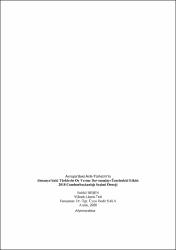| dc.contributor.advisor | Sala, Bedir | |
| dc.contributor.author | Beşen, Behlül | |
| dc.date.accessioned | 2021-10-13T14:29:15Z | |
| dc.date.available | 2021-10-13T14:29:15Z | |
| dc.date.issued | 2020 | en_US |
| dc.date.submitted | 2020 | |
| dc.identifier.uri | https://hdl.handle.net/11630/9473 | |
| dc.description.abstract | Yabancı düşmanlığının içerisinde ele alabileceğimiz Türk Karşıtlığı, Türk Düşmanlığı, Türkofobi ve Anti-Türkizm kavramları Avrupa’da hızla artan bir olgu haline gelmiştir. Yabancı düşmanlığının farklı bir boyutu gibi görülen bu olgu ve olgular Avrupa’nın birliğine olduğu kadar Avrupa’da farklı sebepler ile bulunan yabancılar/göçmenler için de tehlike arz etmektedir. Avrupa toplumlarında yaşayan bireylerin ‘ötekileştirme’, ‘düşman görme’ gibi reflekslerini siyasi ve bütünleştirici politikalar ile azaltmak, yok etmek gibi amaçları edinmeyen Avrupa siyaseti aksine bu düşmanlığı ve ötekileştirmeyi her geçen gün destekler politikalar üretmeye devam etmektedir. Bu politikalar neticesinde kendilerini ‘öteki’ kategorisinde görmeye zorlanan göçmenler bulundukları ülkelerde entegrasyonu da sağlamakta güçlük çektikleri bilinmektedir. Bu noktada demokratik tepkilerin en önemli unsuru olan ‘sandık’ göçmenler için de bir tepki unsuru haline gelebilmektedir. Vatandaşı oldukları ülkelerdeki ve yaşadıkları ülkelerde olan politikaları zihinlerindeki sistematik ile değerlendiren seçmenler bir oy davranışı geliştirmektedirler. Bu çalışmada; Avrupa’da ve özellikle Almanya’da yaşayan Türk seçmenlerin artan Türk Düşmanlığı/Anti Türkizm/ Türkofobi gibi olgulara verdiği tepkileri nasıl değerlendirdikleri, demokratik hakları olan seçimler ile nasıl bir bağ kurdukları değerlendirilmiştir. Almanya’da yaşayan Türk seçmenlerin yaşadıkları maruz kaldıkları zenofobi olgusunun oy davranışlarına nasıl etki ettiğine dair çalışmalar azdır. Bu çalışma sayesinde literatüre bir referans kazandırılması amaçlanmıştır. Bu kapsamda da Almanya’da yaşayıp Türkiye’deki seçimlerde oy kullanmaya yeterliliğine sahip seçmenlerin 2018 Cumhurbaşkanlığı seçimlerindeki oy davranışlarının ne yönde ve nasıl etkilendiği 40 kişiyle yapılan derinlemesine görüşme/mülakat neticesinde tespit edilmiştir. Avrupa’da artan Türk düşmanlığı ve Anti-Türkizm olgularının seçmenlerin oy eğilimlerinde ve seçime katılımlarında etkili olduğuna, seçmenlerin Türkiye’deki seçimlerde oy kullanırken ‘lider’ faktörüne önem verdiklerine, ‘aile’ faktörünün seçmenler üzerinde önemli bir yer tuttuğuna ve seçmenlerin kendilerini savunduğunu düşünen adaylara daha pozitif eğilimler sergiledikleri sonucuna ulaşılmıştır. | en_US |
| dc.description.abstract | The concepts of Turkophobia and Anti-Turkism, which we can consider within xenophobia, have become a rapidly increasing phenomenon in Europe. These phenomena, which are seen as a different dimension of xenophobia, pose a danger to the unity of Europe as well as to foreigners/immigrants who are in Europe for different reasons. Contrary to European politics, which does not adopt the aims of reducing or eliminating the reflexes of individuals living in European societies such as 'othering' and 'seeing as enemies' with political and integrative policies, it continues to produce policies that support this hostility and marginalization day by day. It is known that immigrants who are forced to see themselves in the "other" category as a result of these policies have difficulties in ensuring integration in their countries. At this point, the 'ballot box', which is the most important element of democratic reactions, can also become a reaction element for immigrants. Voters who systematically evaluate the policies in their countries of citizenship and the countries they live in, develop a voting behavior. In this study; It has been evaluated how Turkish voters living in Europe and especially Germany evaluate the reactions they give to phenomena such as Anti-Turkism / Turkophobia and how they establish a connection with the elections with democratic rights. There are few studies on how the xenophobia phenomenon experienced by Turkish voters living in Germany affects their voting behavior. Thanks to this study, it is aimed to provide a reference to the literature. In this context, the Turkish voters living in Germany who have the competence to vote in the elections in Turkey how to vote in the 2018 presidential elections that affected their behavior in-depth interviews with 40 people / were identified in interviews as a result. Growing hostility towards Turks in Europe and that of Anti-Turkism cases became effective in voter participation while voting in elections in Turkey, voters' gave importance to the 'leader' factor and the 'family' factor that held an important place on the voters. Voters displayed more positive tendencies to candidates who felt they were defending themselves. | en_US |
| dc.language.iso | tur | en_US |
| dc.publisher | Afyon Kocatepe Üniversitesi Sosyal Bilimler Enstitüsü | en_US |
| dc.rights | info:eu-repo/semantics/openAccess | en_US |
| dc.subject | Yabancı düşmanlığı | en_US |
| dc.subject | Anti-Türkizm | en_US |
| dc.subject | İslamofobi | en_US |
| dc.subject | Almanya | en_US |
| dc.subject | Seçmen Davranışı | en_US |
| dc.title | Avrupa'daki Anti-Türkizm'in Almanya'daki Türklerin oy verme davranışları üzerindeki etkisi: 2018 Cumhurbaşkanlığı seçimi örneği | en_US |
| dc.title.alternative | The effect of Anti-Turkism in europe on the voting behavior of Turks in Germany: The case of the presidential election 2018 | en_US |
| dc.type | masterThesis | en_US |
| dc.department | Enstitüler, Sosyal Bilimler Enstitüsü, Sosyoloji Ana Bilim Dalı | en_US |
| dc.relation.publicationcategory | Tez | en_US |
| dc.contributor.institutionauthor | Beşen, Behlül | |



















